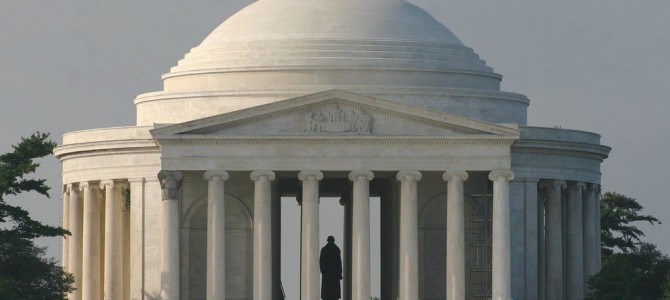
I read with interest this column by Paul DeHart, written in response to my column blasting Mike Huckabee for his view of resistance to a potential Supreme Court decision striking down state bans on marriage by same-sex couples. I can’t praise DeHart enough for his discussion of Founder-era notions of the role of the federal judiciary, but as a rebuttal to my point that Huckabee’s statement was “legally speaking, gobbledygook,” DeHart’s column is sorely lacking.
I gave four reasons why Huckabee missed the mark when he suggested that the Supreme Court cannot decide “the law of the land,” cannot overrule the other branches of government, and cannot cause states to allow same-sex marriages without the states first passing implementing legislation. DeHart grapples with none of this, and I reiterate that Huckabee is off in fringe territory with his claims.
Contra Huckabee, the Supreme Court can both decide whether a law passed by Congress is constitutional, and it may override the other branches of government in making its decision. We need look no further than the high court’s long practice, including such recent decisions as Citizens United v. FEC (overturning Congress against the wishes of the executive branch), NLRB v. Noel Canning (overturning the executive branch to the benefit of the Senate), and U.S. v. Windsor, (overturning Congress with the support of the executive branch). Thus, Huckabee’s assertions regarding the Court’s powers when it comes to disputes between the branches of government are obviously and indisputably false as a matter of legal practice and precedent. Individuals can, and often do, disagree with the high court’s decisions, but their disagreements do not alter the law. The Supreme Court does not get the only say on the constitutionality of laws, but it does get the final say. Because DeHart does not respond on this issue, I do not know whether he agrees with Huckabee on this.
Remember the Supremacy Clause
Similarly, Huckabee’s claim that state officials can foil a Supreme Court decision striking same-sex marriage bans by simply declining to pass implementing legislation is obviously false as both a matter of constitutional law and of practice. As I wrote, the supremacy clause prevents states, outside of the amendment process, from determining that the Constitution means something other than what the high court decides.
Moreover, marriages pursuant to court decisions have been and continue to be offered in many states without any implementing legislation. For example, states like California that legalized marriage between same-sex couples via the state judiciary were granting valid marriage licenses to same-sex couples long before the legislation altered the myriad state statutes referring to husbands and wives to instead reference spouses. Several states like my home state of Oklahoma, which had its marriage ban struck down by a federal court, are presently allowing marriages between same-sex couples without altering any state statutes.
In other words, legislation subsequent to judicial decision does not ratify the court’s decision, as Huckabee asserts. Such legislation simply catches up to an already-implemented legal regime. Again, because DeHart does not address this issue, I do not know whether he agrees with me that Huckabee’s claim was gobbledygook or whether DeHart thinks instead the current state of affairs in the United States is part of my “convoluted doctrine.”
Who Won the Founders’ Constitutionality Debate?
Finally, in response to Huckabee’s vagueness about what would happen if state officials declined to comply with a federal decision on marriage bans, I analogized to the example of anti-desegregation efforts in Arkansas. I also pointed to the recent case of the Florida county clerks who attempted to ignore a federal district court’s decision striking Florida’s marriage ban as unconstitutional. The judge responded to the rebelling clerks with a pointed note explaining that they could find themselves on the losing end of an order to pay the court costs for couples forced to sue them to obtain compliance. The clerks backed down. My reason for pointing this out was that there is no great mystery about what will happen should state officials take Huckabee’s advice.
Rather than address these points, DeHart instead disputes a single sentence of my column, in which I asserted that the Founders’ era decision in Marbury v. Madison settled the question of whether the Supreme Court gets the final say on the constitutionality of laws. DeHart ably demonstrates that there was debate among the American founders as to judicial supremacy. However, DeHart does not address whether the objecting founders prevailed in their view, probably because they did not. This is the difference between notional law and normative law, between academic discussion and legal precedent. DeHart describes the way things could have been. I described the way things actually turned out.
If there is really any outstanding question on this issue, I think we can agree it is likely to be settled in the near future. To make it a bit more fun, though, I will make DeHart a conditional wager in the circumstance that the Supreme Court strikes state marriage bans as unconstitutional this term. (Remember, this is still a hypothetical situation; the Court might find a way to let the bans stand.) The stakes are that the loser buys the winner a case of the winner’s choice of beer. I wager that if the high court strikes state marriage laws, that decision will be enforced and implemented in all states notwithstanding the opposition of state officials, thus demonstrating that my theory of judicial supremacy has prevailed. Well, professor?








